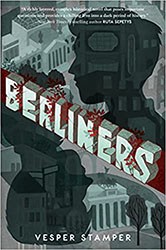The tensions present in Israeli culture during the 1960s are at the heart of Alex Paz-Goldman’s engrossing novel, The Lost Spy and the Green Dress. Twelve-year-old Motti struggles with his ambivalent feelings about his parents, both of whom are Holocaust survivors. His father is unable to earn a living, both parents are depressed. Motti views their persistent use of Yiddish rather than Hebrew as a sign of intractable victimhood. Why, he asks his friend Reuven, did his mother not arm herself against the Nazis, or emulate the heroes of Masada, “who preferred death over slavery”? Trying to make sense of the contradictions in his life, Motti becomes obsessed with the idea of duplicity and espionage.
Set in a time in which Israel has recently experienced the trial of Adolf Eichmann, unresolved questions loom — namely, how to reconcile the tragedy of the Holocaust with the triumph of Israel’s birth. Motti notes the inconsistencies that surround him. His father’s stay in a “convalescent home” does not lead to rehabilitation. His parents’ constant arguing, and his father’s consuming interest in news items about spies, are confusing. Only his father has a surviving relative — a twin brother who represents an alternative, and more adaptive, way of living with the past.
History does not overshadow character psychology in this well-paced story, as the author includes plot lines about friendship and romantic feelings. Motti’s friend Reuven is the son of Iraqi Jews. Their loyalty to their own language and culture does not allow them to identify with Motti’s Eastern European inheritance of loss. Reuven is hyperrational, using logic to compensate for instability. Before long, the two boys become enmeshed in a scheme to catch an alleged Nazi spy. Subtle touches offer insight into the characters’ inner lives, such as when Motti feels himself drawn to the peasants depicted in a picture by Van Gogh, identifying with their loneliness. The complexities of Motti’s attraction to Reuven’s sister emerge in a scene in which the two boys require her assistance while putting on Purim costumes. Motti is left speechless as sexual feelings, tenderness, and awe all intersect. “It was a miracle my tongue stayed connected to my jaw,” he says.
There is no easy time to come of age as a young adult. In Paz-Goldman’s skillfully woven story, When Motti challenges his father about the moral implications of German reparation payments, his father tries to explain that, sometimes, “we have no choice. When you grow up you will understand … Sometimes life is more powerful than principles.” While this advice might provoke different responses, its resonance with the mindset of many in 1960s Israel gives this accomplished novel a unique perspective.
Emily Schneider writes about literature, feminism, and culture for Tablet, The Forward, The Horn Book, and other publications, and writes about children’s books on her blog. She has a Ph.D. in Romance Languages and Literatures.





